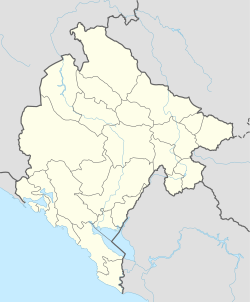Ulcinj
| Ulcinj | ||
|---|---|---|
| Town | ||
 |
||
|
||
| Location of Ulcinj | ||
| Coordinates: 41°55′N 19°12′E / 41.92°N 19.20°ECoordinates: 41°55′N 19°12′E / 41.92°N 19.20°E | ||
| Country | Montenegro | |
| Municipality | Ulcinj Municipality | |
| Settlements | 39 | |
| Government | ||
| • Mayor | Nazif Cungu | |
| • Ruling party | DPS - Forca - DP | |
| Area | ||
| • Total | 255 km2 (98 sq mi) | |
| Population (2011 census) | ||
| • Total | 10,828 | |
| • Density | 79.47/km2 (205.8/sq mi) | |
| • Municipality | 20,290 | |
| Demonym(s) | Ulcinjani Ulqinakë |
|
| Time zone | CET (UTC+1) | |
| • Summer (DST) | CEST (UTC+2) | |
| Postal code | 85360 | |
| Area code | +382 30 | |
| ISO 3166-2 code | ME-20 | |
| Car plates | UL | |
| Website | http://www.komunaeulqinit.com | |
Ulcinj (Montenegrin Cyrillic: Улцињ, pronounced [ǔlt͡siɲ]; Albanian: Ulqini) is a town on the southern coast of Montenegro and the capital of Ulcinj Municipality. It has an urban population of 10,707 (2011), the majority being Albanians.
As one of the oldest settlements in the Adriatic coast, it was founded in 5th century BC. It was captured by the Romans in 163 BC from the Illyrians. With the division of the Roman Empire, it became part of the Byzantine Empire. During Middle Ages it was under South Slavic rule for a few centuries. In 1405 it became part of Republic of Venice and in 1571 part of Ottoman Empire. Ulcinj was ceded to the Principality of Montenegro in 1880. It is a former medieval Catholic bishopric and remains a Latin titular see.
Ulcinj is a famous destination for tourists, because of its Long Beach, Lake Šas, Ada Bojana Island and for its two-millennia-old Ulcinj Castle. Ulcinj is also the centre of the Albanian community in Montenegro.
Early historian Livy (59 BC–AD 17) mentioned it, as did Pliny the Elder (23–79), who mentioned it as Olcinium, its old name Colchinium, "founded by [settlers from] Colchis" (Olchinium quod antea Colchinium dictum est a Colchis conditum).Ptolemy (90–168) mentions the city as Greek Oulkinion (Ουλκίνιον). The name, through Late (Vulgar) Roman, became Middle Latin Ulcinium, Slavic Ulcinj, Italian: Dulcigno (pronounced [dulˈtʃiɲɲo]) and Turkish: Ülgün.
...
Wikipedia


